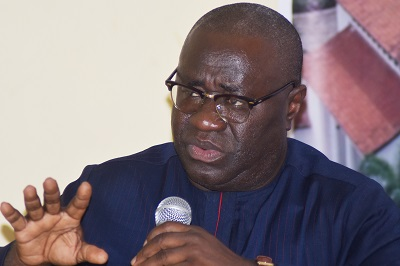
Audio By Carbonatix
Security consultant Prof Kwesi Aning has highlighted that the conflict in Bawku has evolved beyond ethnic tensions and chieftaincy disputes, now being primarily driven by organised crime and a transnational network.
Speaking on the JoyNews AM Show, he revealed that the violence, which has been ongoing for years, is now primarily driven by organised crime rather than the ethnic tensions and leadership struggles that initially sparked it.
Prof Aning emphasised that the situation in Bawku is far more complicated than most people realize.
“The presupposition and the common perception are that what is happening in Bawku is essentially a conflict between two groups of people. My agreement, however, is that it has transcended these two groups. It has also moved beyond chieftaincy issues,” he explained.
He pointed out that the real force behind the continuing violence is criminal networks, which have capitalised on the existing ethnic and traditional leadership tensions in the region.
“What we are witnessing in Bawku today is being driven more by criminality and a transnational network. These criminal groups use the notions of ethnicity, ethnic identity, and long-standing suspicions surrounding chieftaincy to further their agendas,” Prof Aning noted.
Although the professor refrained from delving into sensitive details about the criminal groups involved, he made it clear that the conflict has become much more complex. “But I cannot delve too much into this, as I hold a public office, and such matters are sensitive,” he said. His comments, however, underscore the significant role criminal groups are playing in fueling the violence in Bawku.
Prof Aning also criticised the popular narrative that frames the conflict as merely an ethnic or chieftaincy issue.
He warned that this view oversimplifies the situation and can worsen the violence.
“The argument that it is simply an ethnic or chieftaincy issue is false. It does not help the situation at all. In fact, it may even exacerbate tensions, which are already at a breaking point,” he stated.
The professor pointed to the government's inability to effectively address the crisis, given the lack of resources and strategic planning.
“I can assure you that the situation is a delicate one, on the verge of becoming a scorched-earth policy. We do not have the necessary resources or the strong foundation to resolve this effectively. There is a need for more strategic focus, and without that, the crisis will only deepen,” he said.
Professor Aning concluded with a stark assessment of the government’s capabilities, stating, “That I can tell you, and we cannot calm the conflict. We don’t have the resources, we don’t have the backbone.”
Latest Stories
-
Securing children’s tomorrow today: Ghana launches revised ECCD policy
2 hours -
Protestors picket Interior Ministry, demand crackdown on galamsey networks
2 hours -
Labour Minister highlights Zoomlion’s role in gov’t’s 24-hour economy drive
2 hours -
Interior Minister receives Gbenyiri Mediation report to resolve Lobi-Gonja conflict
2 hours -
GTA, UNESCO deepen ties to leverage culture and AI for tourism growth
3 hours -
ECG completes construction of 8 high-tension towers following pylon theft in 2024
3 hours -
Newsfile to discuss 2026 SONA and present reality this Saturday
3 hours -
Dr Hilla Limann Technical University records 17% admission surge
3 hours -
Meetings Africa 2026 closes on a high, Celebrating 20 years of purposeful African connections
3 hours -
Fuel prices to increase marginally from March 1, driven by crude price surge
3 hours -
Drum artiste Aduberks holds maiden concert in Ghana
4 hours -
UCC to honour Vice President with distinguished fellow award
4 hours -
Full text: Mahama’s State of the Nation Address
4 hours -
Accra Mayor halts Makola No. 2 rent increment pending negotiations with facility managers
4 hours -
SoulGroup Spirit Sound drops Ghana medley to honour gospel legends
4 hours

